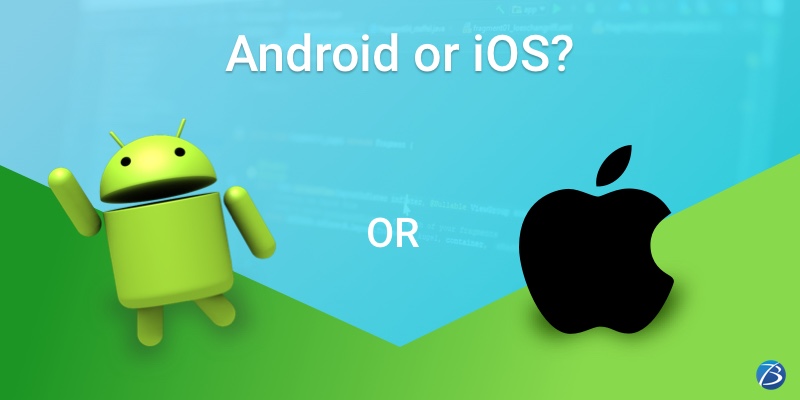
In October 2020, Android and iOS jointly contributed to almost 99% of the global market share, as per a report shared by the renowned market research portal- Statista. Android alone contributed to 72.92% of the market due to its affordable costs and ease of use as compared to other platforms.
These staggering numbers indicate the huge popularity of Android and iOS platforms in the mobile app development world. But when it comes to developing the apps, the majority of businessmen and entrepreneurs find difficulty in choosing the right platform. Due to the lack of knowledge about each platforms, they prefer at times creating apps on both platforms; however, it is always smarter to initially go with one of them as it reduces risks and keeps the costs to the minimum.
So this blog will help you to gain insights on choosing the apt platform for your app. Through this blog, we will compare some significant factors like target audience, budget, features, timelines, and many more for both these platforms. It will help in making an informed decision. But before starting, let us have a quick look at the pros and cons of both.
Pros and Cons of Android App Development
Pros:
- Hardware independent as Java is being used for development
- Higher flexibility and fewer restrictions in this operating system
- Wider community and user-base
- Ready-made templates, plugins, etc. for easier design and development
- Simpler app acceptance and release process while publishing
Cons:
- A large number of devices having different screen sizes and resolutions
- Complex and time-consuming testing process
- Costlier due to extensive testing requirement and fragmentation
- Security concerns
Pros and Cons of iOS App Development
Pros:
- Outstanding performance and stability
- Easy integration of devices
- Intuitive user interface and user experience
- High-class users leading to better revenue
Cons:
- The stringent and difficult release process
- Difficult customization due to the restrictions imposed by iOS
- Smaller market share
Android or iOS App Development? Choosing the Best Platform for Your Business!

Target Audience
Where is your target audience located?
Usually, Android is preferred more in the developing nations while iOS is highly used in the developed nations. Android’s presence is much stronger in Asia, Latin America, Africa, etc. while iOS is dominant in North America, Western Europe, etc. So, to reach the global audience, businesses should consult Android app development services that have a global outreach.
Also consider factors like the average age of your audience, their income ranges, educational backgrounds, etc. The audience with higher incomes and better educational backgrounds tend to prefer technically advanced iOS devices. Younger customers focus more on in-app purchases while older customers are willing to buy the apps altogether.
Budgetary Constraints
Cost is one of the most significant considerations for mobile app development. It depends on the scope of the project, features to be embedded, complexity of the app, how many OS versions and devices are required, etc. So, at times, both iOS and Android app development can be equally expensive.
Yet, iOS app development is considered somewhat cheaper than Android. This is so because coding in iOS is comparatively easier. Android apps need to be written in Java which requires more writing than Swift language for iOS.
But when it comes to publishing the app, Android charges a one-time fee of $25 while iOS charges an annual fee of $99 for individual iOS app developers and $299 if a company publishes the app.
Features to be Embedded in the App
What features are you looking for to be integrated into your app?
If security and superb aesthetics is your priority, iOS is the perfect pick. But if you are looking for highly customizable apps that meet the end-users expectations, Android should be your choice.
Development Complexity
When it comes to the complexity of mobile app development, iOS is a clear winner over Android due to the difference in device fragmentation and programming language used.
iOS development is quicker than Android. In the case of Android, there are a host of devices like smartphones, tablets, etc. with diverse screen sizes available in the market. As a result, creating an Android app that is compatible with all of these, becomes a complex process.
Time-to-Market
How early do you want your app to be released in the market?
Well, as we already know, Android has a bit complex development process due to a variety of devices available. Also, an Android app needs to be tested on all such devices which again is a time-intensive process. So, comparatively, Android app developers need to do a lot of work increasing the time-to-market. Consequently, businesses who want their app to be out in the market at the earliest prefer iOS development.
Revenue Generation
To make your app lucrative, you need to choose the platform that will prove to be more profitable. Android has a bigger market share, however, iOS contributes to higher revenue generation. In 2017, Revenue generation for Apple Store was about $38.5 billion while for google play it was $20.1 billion. So, it is quite clear that iOS apps generate better revenue.
Key Takeaways:
Selection of the right platform plays a key role in the success of your app and your business. Both- Android and iOS platforms have their pros and cons and so, we cannot comment on whether one of them is a perfect choice. They have diverse purposes to serve. Android app development is a great pick if you aim to reach a broader market while iOS app development is perfect when your target audience belongs to a region where iOS devices are being used extensively and quality is your top-most priority. So, this decision depends completely on your business goals and the requirements of your target audience.
I hope the blog was insightful and will help you in the decision-making!
Feel free to share your thoughts, experiences, and queries with us in the comments.

